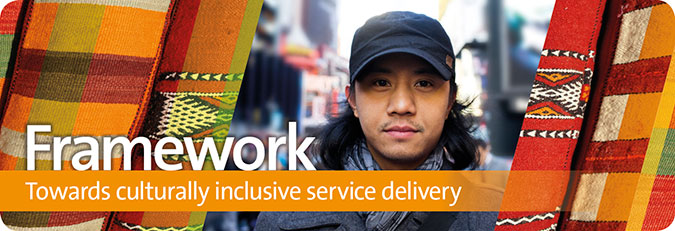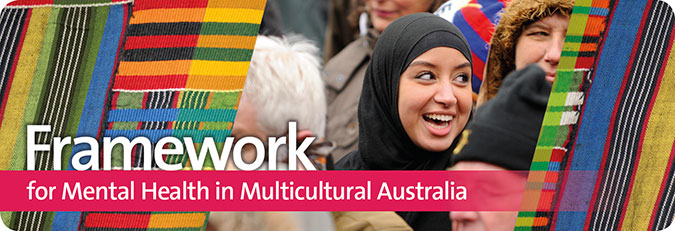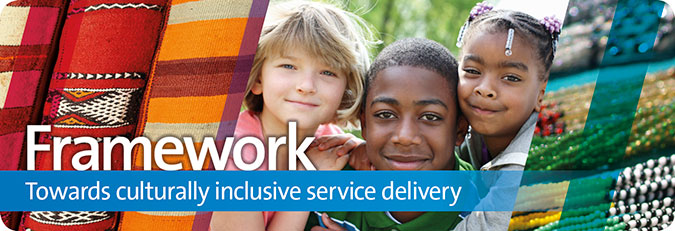INTRODUCTION - Values and Principles
The Framework builds on the following MHiMA values and where relevant is weblinked to a key concept sheet which provides more detailed information about this topic
Values:
-
Inclusion
Having an all- encompassing understanding of mental health and well-being; actively breaking down language and cultural barriers; stimulating services to become more responsive; promoting cooperation and collaboration. -
Respect & Trust
Honouring the lived-experience of all; seeking out a multitude of views and voices; demonstrating flexibility; fulfilling commitments we make. -
Resilience
Promoting healthy debate on mental health in multicultural Australia; strengthening a diversity of cultural values; harnessing opportunities to enhance the wellbeing of individuals and communities; learning from challenges and applying lessons learnt. -
Responsibility
Giving and receiving honest and reasonable feedback; ensuring that the information we provide is high quality and evidence-based; seizing opportunities to take action that will lead to a positive change. -
Reflection & Action
Working together to develop culturally and linguistically sound and meaningful mental health information; identifying a diversity of relevant projects; carefully considering the implications of relevant cultural and mental health research; making well-informed decisions. -
Unity & Diversity
Unifying efforts to improve the mental health literacy of all members of our community; promoting the human rights of all people including those with mental illness and their carers; practicing cross-cultural ethics.
The Framework also fully adopts the principles underlying the Fourth National Mental Health Plan (2009).
Principles
- Respect for the rights and needs of consumers, carers and families
CALD consumers, their carers and families should be actively engaged at all levels of policy and service development. They should be fully informed of service options, anticipated risks and benefits. CALD consumers and carers should be able to access information in a language they understand or have access to interpreters. CALD families and carers should be informed to the greatest extent consistent with the requirements of privacy and confidentiality about the treatment and care provided to the consumer, the services available and how to access those services. They need to know how to get relevant information and necessary support. The different impacts and burdens on paid and unpaid carers from CALD backgrounds need to be acknowledged. - Services delivered with a commitment to a recovery approach
Mental health service providers should work within a framework that supports recovery both as a process and as an outcome to promote hope, wellbeing and autonomy. They should recognise a person's strengths including coping skills and resilience, and capacity for self-determination. This may require attention to socio-cultural issues in recovery. - Social inclusion
Recognition of the importance of social, cultural and economic factors to mental health and wellbeing means that both health and social issues should be included in the development of mental health policy and service development. The principle includes support to live and participate in the community, and effort to remove barriers which lead to social exclusion such as stigma, negative public attitudes and discrimination in health and community settings. The National Social Inclusion Principles should underpin reform in mental health. - Recognition of social, cultural and geographic diversity and experience
Our community is rich in diversity. It embraces cultural and religious differences. This brings many strengths and opportunities, but we also need to recognise the challenges some within our community face at times. There should be demonstrated cultural competency in the planning and delivery of responsive mental health services to people from CALD backgrounds. - Recognition that the focus of care may be different across the life span
Mental health services, whether in the primary care or specialist sector, cannot be provided as a 'one size fits all' across the age range of CALD consumers and carers. The family will play a different role where an infant or child is the focus of care. Mental health care for older migrants and refugees may involve greater support to their family or to staff of residential facilities. - Services delivered to support continuity and coordination of care
While recognising that different service types and locations are important, services across the spectrum of age and need should be developed and delivered in a way that reduces the risk of people falling through gaps, reduces unnecessary duplication and complexity, and promotes information sharing. This depends on both collaboration between services at all levels, and integrated models of service delivery, including multicultural sector services. - Service equity across areas, communities and age groups
Mental health should be provided at a standard at least equal to that provided in other areas of health. Services should be informed by the available evidence and look to innovative models as examples of service improvement. While it is not appropriate or possible that uniform service provision exists in every area or across all CALD age groups, we should strive for equity of access and equity of quality. Services should strive to be accessible and responsive. The level of service provision and the outcomes of care should be transparent to consumers and carers. - Consideration of the spectrum of mental health, mental health problems and mental illness
Mental health promotion, prevention and early intervention need to include consideration of the spectrum - from health and wellbeing, to mental health problems, to mental illness. The range of service options needs to include those illnesses that are most often managed within the primary care sector, as well as those that may require greater specialist involvement. Services should be provided on the basis of need, not diagnosis or whether an illness is common or uncommon. Service options need to be responsive to the needs of different CALD groups, including young children and older people, and to the differing needs of those who suffer particular illnesses, such as perinatal mental health problems and eating disorders.
Previous
Previous Page











